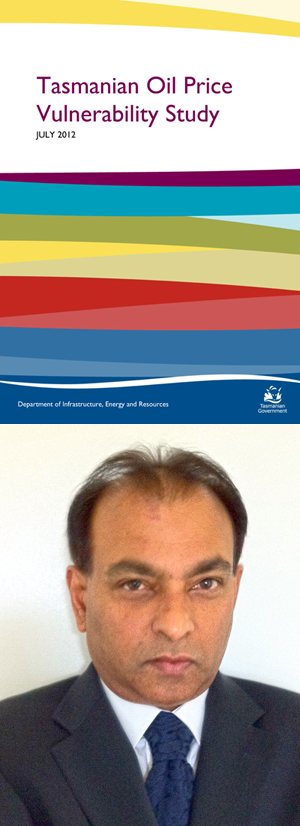The cost of oil will kill our economy if we don’t do something about it, says a Tasmanian government report. [17 December 2013 | Peter Boyer]

Dr Rana Roy, principal consultant, Tasmanian Oil Price Vulnerability Study
The challenges facing Nelson Mandela as the first president of a unified South Africa were as big as they get. But when he spoke about what needed to be done, it all seemed eminently achievable.
His rare ability to think outside normal political boundaries won over past enemies – politicians, police, military, the Springboks – and got the country through this dangerous time relatively intact.
When Mandela was in charge party politics faded into the background, because through him people came to see that when a breakdown of civil society was in prospect, division was death. Obvious, really, but hard to see when things are tough and nerves are stretched.
Tasmania is not South Africa, and neither Lara Giddings nor Will Hodgman is (or would claim to be) a Nelson Mandela. But there’s a hugely important lesson to be learned from him about facing up to daunting prospects openly and candidly, and bringing people together to deal with them.
One of Tasmania’s most daunting prospects is more expensive oil, an essential ingredient in our transport system affecting pretty well everything we do. Tasmania must import all its oil at a current cost of $1.1 billion a year and rising, and doing nothing about it will see us hitting the wall.
The topic is hardly a new one around transport circles. For years the motoring body NRMA has pressed for a national oil strategy. This year it commissioned a report by the former deputy air force chief, Vice-Marshal John Blackburn.
Referring to an international agreement to hold oil reserves against a global oil supply emergency, Blackburn reported that Australia was alone among 28 signatory countries in failing to meet its stockholding levels despite the fact that we’re the world’s ninth-largest energy producer.
To the credit of its government and especially its sustainable transport minister, Nick McKim, Tasmania is the first Australian state to make a serious study of its vulnerability to rising oil prices.
The study, whose report was released this month, found that the upward trend in oil prices, at present 260 per cent higher than in 2003, is likely to continue for the foreseeable future, and that Tasmania is more vulnerable to the impacts of this than any other Australian state.
The report reflects the insights of consultant Rana Roy, a specialist in public and infrastructure economics engaged by the Department of Energy, Infrastructure and Resources (DIER).
Tasmanian oil price vulnerability, says Roy, isn’t about the future but about what’s happening now. Past oil price increases have been a big factor in our present economic difficulties.
If we don’t act, the report says a rising cost of oil will bring even lower employment, productivity, capital stock, wages, consumption, investment and exports. All in all, a bleak economic outlook.
This doesn’t have to be the case. The study also found that while there’s no single solution to the problem, oil-importing countries have successfully increased resilience through broad-based partnerships between government, business and community organisations.
Expecting the marketplace to sort things out won’t work. The DIER study reported that in all oil-dependent economies, market outcomes depend on a high degree of government intervention at all levels, international down to local.
Standards for safety, emissions and fuel efficiency, roads and bridges, vehicle registration, fuel excise, road tolls, public transport, cycling and walking facilities – all government functions – strongly influence how our oil economy works (or doesn’t).
Any or all of these functions plus many more besides can become invaluable levers in lowering Tasmania’s dependence on oil. The study singles out 10 key actions which, with cooperative endeavour, are capable of seeing us through the challenges ahead.
Top of the list is applying fuel efficiency standards to vehicles sold in Australia. Roy points out that Australia’s failure to apply minimum standards puts it behind China, a ludicrous situation compounded by the political decision to exclude motor vehicles from carbon pricing.
Among other actions proposed are alternative vehicle fuels, a shift from private to public transport, a land-use planning system that takes account of transport costs, and use of the state’s strong science and research sector to drive innovation.
This thorough, well-researched study gives legislators and administrators a sound basis to develop good policy for mitigating the impact of higher fuel costs. But a sound policy basis is just a start.
Roy earned his doctorate with a study of the economics of long-term technical change, and for much of his career in the UK worked to develop dialogue between government, business and communities. He is especially concerned about the role of civil society in the change process.
Many economists have no interest in such things, which is unfortunate because the central ingredient in developing a resilient economy is a well-functioning community sector that promotes public discourse and gets involved in decision-making.
A civil society demands open, alert and responsive government. The oil price vulnerability study happened because a minister was interested enough to push it and because one or two smart public servants in key positions grasped its importance and secured some very good consultant advice.
But it took longer than it should have because such matters aren’t the everyday stuff of government here. They should be, and the sooner both sides of politics come to grips with the findings of this study, the better. May Nelson Mandela be their guide.
• To download the study, click here.
